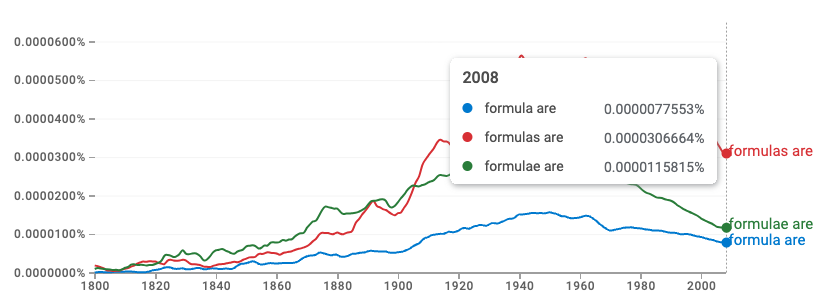In mathematics language plays a critical role in conveying precision and clarity. One common point of confusion is the usage of formulae and formulas. While both terms are correct, they have distinct meanings and applications. Understanding the differences can help you communicate more effectively, especially in academic and formal settings.
What is the Difference Between Formulas and Formulae?
In this blog post, we’ll explore the differences between these terms and when to use each. We’ll also discuss the regional variations and preferences that can influence usage. By the end, you’ll have a better understanding of the nuances and be able to use the right term for the right situation.
for·mu·la /ˈfɔːmjʊlə/: - n. pl. for·mu·las or for·mu·lae.
What does formulas mean? Formulas is the plural of formula.
Formula is: “A noun that refers to either a specified mathematical computation or a list of ingredients used in various concoctions and potions.”
And, because English is unpredictable sometimes, formula can also be a liquid fed to babies.
Here are some examples of formula in a sentence:
- David was struggling with his mathematics homework, so he referred to the formula sheet for help.
- “If you had only followed my formulas, you would have gotten the correct answer!” yelled the tutor.
Formula comes from an old Latin word that, roughly translated means little form. It has been in use in English since the early 17th century.
In everyday conversation or less formal writing, “formulas” is often deemed acceptable and is widely used. This simplification aligns with the tendency in English to form plurals by adding an “s.”
When to Use Formulae
What does formulae mean? Formulae is the plural of the word formula. This alternative means the same thing as formulas and is used in the same contexts. However, it is less common than formulas and is often considered more formal. Generally, formulae is used in academic and scientific contexts, while formulas is used in everyday conversation. So, if you’re writing a paper for a mathematics class, you might want to use formulae. If you’re talking to your friends about your mathematics homework, you might want to use formulas.
Also, formulae is more common in British English, while formulas is more common in American English. This is not a hard and fast rule, however, and you will see both spellings in both contexts.
Modern Usage of Formulas and Formulae
The analysis below shows the plural formulas has also become the most common to use in a scientific context.
The traditional distinction is that formulas should be used in general writing and formulae in mathematical and scientific contexts. However, the modern trend is to use formulas more in all contexts.
For example the analysis of the Oxford English Corpus shows that formulas is increasingly the dominant form in both technical and general uses.

Image Source: Ngram: “formula are”, “formulas are”, “formulae are”
What Formulas do I need to know for my GCSE Maths Exams?
GCSE Maths Formulas Students Need to Learn contains a list of the formulas. The Study23 GCSE Maths Formula Flash Cards also contain all the formulas you need to know for your GCSE Maths exams.
Conclusion
Is it formulas or formulae? Whether to use “formula” or “formulae” depends on the context, audience, and personal preferences. Both terms are correct: Formulas and formulae* are two plurals of the noun formula (which has a few different meanings).
- The term formula is more common in everyday conversation and informal writing.
- The plurals are interchangeable in most contexts, but formulae is more traditionally common in academic and scientific contexts, although formulas is increasingly common in these contexts too.
Study23 GCSE Maths Formula Flash Cards
Check out the Study23 GCSE Maths Formula Flash Cards, they’re a great way to help you memorise the formulae for your GCSE Maths exams.
Related Posts
- 10 Free Learning Resources for GCSE Maths
- A Glossary of GCSE Maths Terms
- Boost GCSE Scores: The Maths Flash cards Advantage
- Break Free from Math Anxiety - A Holistic Approach During Your GCSEs Revision Journey
- Bridging the Gap Between Decimals, Fractions, and Percentages